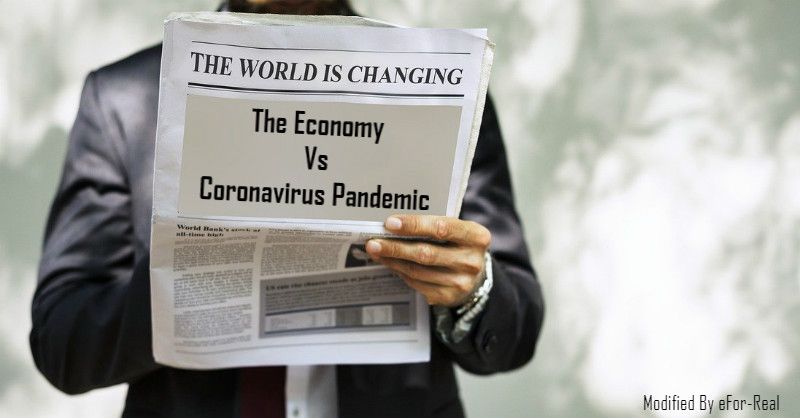Should The Economy Take Precedence Over Very Dangerous Pandemics Like The Coronavirus?
1) Michael Menninger, CFP(r)
 In my personal and professional opinion, the economy should NOT take precedence over COVID-19, but the virus should be considered when trying to get the economy going again.
In my personal and professional opinion, the economy should NOT take precedence over COVID-19, but the virus should be considered when trying to get the economy going again.
This is a very delicate balance.
If we waited until the virus has been eliminated, it will likely be too late to recover from the damaging impact on the economy. The US, and possibly the entire world could enter a depression that could be worse than the early ’30s. If that were to be the case, then the impact on human life could be greater than that of COVID-19.
For example, suicide and overdose deaths could become prevalent, as well as deaths due to malnutrition, homicides (people seeking money or food), homelessness and other related deaths. At this point, there is no way of measuring either risk, but they both exist.
I believe that a solution could be to allow workers to re-enter the workforce but in a very controlled manner. In manufacturing, ensure that laborers maintain a socially safe distance from each other, and take necessary precautions to sanitize work conditions, where applicable and necessary.
Businesses could also require all workers to be tested for a fever to report to work. In the case of restaurants, allow them to re-open, but all patrons be required to sanitize by whatever method is deemed appropriate, and all wait-staff wear gloves and masks, and all tables are separated by an appropriate distance, like 6 feet or more.
Just maintain the closure of venues that result in the gathering of large groups of people – bars, concerts, sporting events, etc. Allow those events to be televised so Americans may continue to enjoy them in the safety and comfort of their own homes.
In summary, no, the economy should not take precedence over the virus, but there need to be some intellectual and practical approaches that allow the economy to forge ahead safely. So yes, they can co-exist.
2) Ian Wright
 In a word, it depends. A pandemic like a coronavirus hasn’t been seen in over a century, so we don’t have a lot of relevant precedents to deal with. Moreover, the disease seems to be rather unique in how infectious it is, which posses a big problem. It’s also quite deadly, especially for certain groups. So governments would be negligent if they didn’t take any action whatsoever.
In a word, it depends. A pandemic like a coronavirus hasn’t been seen in over a century, so we don’t have a lot of relevant precedents to deal with. Moreover, the disease seems to be rather unique in how infectious it is, which posses a big problem. It’s also quite deadly, especially for certain groups. So governments would be negligent if they didn’t take any action whatsoever.
However, tanking the whole economy is also an unprecedented move. Many workers and small business owners have suddenly found their income going to zero with almost no warning. This is going to have huge re-precautions down the road. For example, we’ve seen our income drop 70% in a week.
Therefore, I think the question is, have the actions taken by Western governments like the US, Australia, UK and Canada been the right ones? Time will tell of course, but they are not the only options.
South Korea managed to very quickly get the situation under control by tracing back outbreaks and using masks. Japan similarly has had relatively few cases and deaths from the disease. This is again likely due to the use of masks, lack of handshakes and better hygiene. So there are other options out there.
If the economy rebounds quickly, then the cost of saving lives was 100% worth it, however, if it results in a long recession or worse, a depression, even at the cost of saving lives, it begs the question what’s the cost we’re willing to pay to save a life?
3) Pablo Solomon
 President Trump is right up to a point when he says a depression would ultimately cause more deaths than the pandemic. We probably can survive, losing a lot of people better than we can survive a prolonged depression.
President Trump is right up to a point when he says a depression would ultimately cause more deaths than the pandemic. We probably can survive, losing a lot of people better than we can survive a prolonged depression.
We make decisions every day that can be considered putting our wants and needs above our health and safety; and that of others.
We choose to get in our cars every day knowing that 50,000 Americans will be killed in auto-related deaths each year.
We buy the stuff advertised on TV to relieve symptoms and go to school and work and weddings with colds and viruses knowing about 20,000 Americans will die from such illnesses each year.
People have irresponsible sex knowing that they might get deadly diseases and/or be responsible for one of the hundreds of thousands of convenience abortions each year.
We choose elective surgeries in hospitals when each year in America around 400,000 patients will die unnecessarily due to mistakes and lack of proper sanitary precautions. We think being prettier at 60 or being able to play tennis at 70 is worth the risks.
We choose to go swimming knowing nearly 4,000 Americans drown each year.
Well, you get the picture!
Did the Chinese infect us in a form of germ warfare to destroy us as economic competitors? After all, they have one billion more people than we do, to use as few spares as guinea pigs.
Look, life is nothing but a series of decisions. You either make those tough calls yourself or allow someone else to make them. Turning over your choices to someone else is not only cowardly but stupid.
Do you think some vote-buying politician puts you above their self-serving interests?
What if we sit in our homes and save a few lives or go to work and cause a few deaths? We do not know what the outcome might be?
I lean toward trying to find some sort of balance based on science, morals and playing the odds. If we are lucky, breakthroughs in science and medicine may save us from making the tough decisions on this issue. But if history teaches us anything, it is that we will always have tough decisions.
Whoever you are and whatever you are trying to do with this question, your query, and the various responses will all have consequences both positive and negative. Maybe even life and death?? Just be certain that your motives are honorable. I at least think mine are.
Best wishes and stay safe. You are important as a person and for what you do. We will all get through this together.
4) Heather Manto
 Lesser of two evils: I do think that the health of our citizens is important and believe everyone’s life is valuable.
Lesser of two evils: I do think that the health of our citizens is important and believe everyone’s life is valuable.
But in comparing the economy and the health of our citizens- I don’t think either takes precedence over the other. You can’t compare watermelons to asparagus.
What I think we should be discussing is how the current measures violate our constitutional rights. I realize, as a practical human, the importance of attempting to keep a pandemic under control. I think it is our right as citizens of a free nation to decide if we want to risk our health or not.
We all make choices and nobody is endangering another’s health without some implied consent. If a business owner chooses to remain open and a consumer chooses to shop- they have both made a conscious decision to risk their health. If a nursing home resident or senior citizen chooses to allow a visitor, they have made a conscious decision to risk their health. And my point is, we should have a right to make that decision for ourselves.
Rather than spending our time on these matters, we should have placed our time, energy and resources into procuring personal protective equipment (PPE) and test kits- not fighting over stimulus packages, being overwhelmed with unemployment filings, and a declining economy- (none which would be an issue if we allowed citizens to make their own decisions).
We will get the virus, hospitals will be overwhelmed and people with poor health and no access to proper health care will likely die. Perhaps if we had been using the two trillion dollars we had in reserves to improve our health care system before this epidemic, we might not even be choosing between health and the economy and violating citizens’ rights.
Independent contractors, micro and small business, the working poor are those that will suffer the most; whether it be physically, mentally and/or economically. Not to mention, the economic stress will inevitably affect the state of health of these people, I included, and impact their response to this virus.
We start by just taking a little here and a little there, telling people they can or can not do this or that, here or there- and eventually little turns into a lot and a bit becomes more. Disallowing funerals and church services is appalling.
Telling me I can not operate my struggling small business but I can shop at “essential” Walmart with the other 500 people, which is disturbing. We are at a shelter-in-place order in Texas and the amount of people in these ‘essential’ places is disturbing. And really- my question is, what makes Walmart essential- other than their fat pockets?
In conclusion- when reading between the lines of my word vomit- I don’t think one is more important than the other. I think the rights of our citizens to make their own decisions is the most important of the options. Let me choose which I feel is the most important for myself and face the repercussions of my own decisions.
5) Baron Christopher Hanson
 The economy should begin to take precedence over this pandemic if we learn Coronavirus is, in fact, a biologically released weapon of any kind, or if the hysteria has been politically motivated in any way.
The economy should begin to take precedence over this pandemic if we learn Coronavirus is, in fact, a biologically released weapon of any kind, or if the hysteria has been politically motivated in any way.
The sad truth is that Bill and Hillary Clinton will do, orchestrate, pressure, and manipulate ANYTHING globally just to get back into the White House, even if that means seizing politically on a natural disaster such as this to solely bash President Trump –– which Mrs. sour grapes Clinton does every single day.
Whether the CoronaVirus is man-made synthetically, assisted by any foreign lab or distributed by any humans deliberately, or if the strand is born naturally and distributed completely via random human interaction, the fact remains that Corona is an aggressively deadly virus, one seemingly more powerful and communicable than H1N1 or SARS, or so it seems in the mainstream media and government.
At this point, re-opening the global economy under the safest possible measures is becoming imminent. Human contact containment, health and safety, and social distancing are still required, yet the economy must re-open in a matter of weeks, not months. A complete standstill and lockdown, as it is now the world over, is hardly recoverable economically.
Restricting international travel, requiring everyone to wear gloves, and especially to wash all shoes and feet –– not just hands –– may be a way of life going forward, and perhaps seasonally as experts suggest. However, closing down the world indefinitely for an over-hyped, over-closed down, potentially man-made or distributed biological weapon is a decision that must come to head as soon as possible.
6) Mabel Funderburk
 There is no debate that our country should be prioritizing the health and wellbeing of our citizens over the economy. People first, period. It’s simple!
There is no debate that our country should be prioritizing the health and wellbeing of our citizens over the economy. People first, period. It’s simple!
People are not going to be spending money, shopping and buying new items if they get sick. People are not going to buy new cars or buy new homes if they get sick.
When someone becomes infected with the coronavirus, their main focus is getting better and not infecting others. The term, to flatten the curve, is said so much that the phrase seems to have lost meaning. But simply, we need to slow the virus down to make sure that we can provide quality care for those infected.
While I am not an economic or financial expert, I do know that the economy can bounce back, and it will. People are much more fragile, and unfortunately, there’s no coming back once you’re gone. We are not a country that forces people to sacrifice their lives so the stock market can have a good day (At least, not blatantly!).
7) Monica Eaton-Cardone
 This pandemic is so frustrating because we simply don’t know what will happen next. Are we overreacting to it? Underreacting? Right now, there are far more questions than answers, and it would be a terrible, hubris-driven mistake to make knee-jerk assumptions until all the facts are in.
This pandemic is so frustrating because we simply don’t know what will happen next. Are we overreacting to it? Underreacting? Right now, there are far more questions than answers, and it would be a terrible, hubris-driven mistake to make knee-jerk assumptions until all the facts are in.
But ultimately, over the long-run, asking Americans to choose between public safety and economic security is a false choice. It’s like asking someone to choose between liberty and justice: For our society to function, you really, truly need both pillars — or eventually, you’ll have neither.
Without a viable economy, people will starve; without people, the economy will starve. Our economy is the engine that lifts us out of poverty. It’s the piggybank that bankrolls all of our social programs, private charities, retirement accounts, and safety nets.
Later on, when all the facts are in, we’ll be able to analyze the data, crunch the numbers and make thoughtful, reasonable assessments, because the coronavirus pandemic does raise vexing questions about public policy: What if the next pandemic is 10 percent less deadly — should we completely shut our economies down again?
What if it’s 20 percent less dangerous? How about 50 percent? In a situation like this, which metrics are most meaningful? How do we help as many people as we can — without inadvertently hurting so many others? We can’t let the cure be worse than the disease.
But there will be ample time to debate this in the future. Right now, our priority must be the protection of human life, especially the most vulnerable, and I’d rather err on the side of caution. But hopefully, when the facts are in and we have better data, we’ll be able to make future decisions without erring at all.
8) Jesse Cramer
 No, the economy should not take precedence over a dangerous pandemic like the coronavirus.
No, the economy should not take precedence over a dangerous pandemic like the coronavirus.
First and most simply: we know that economies bounce back, and we know that dead people do not.
In more detail, our governments are faced with a version of the *prisoners’ dilemma*. It’s a well-known paradox in game theory. Here’s a quick description of the dilemma’s three choices:
A) Two prisoners choose to cooperate and end up facing a small punishment
B) One prisoner betrays the other. The betrayer gets no punishment, but the betrayed gets a long sentence.
C) Both prisoners betray the other, and both end up facing long punishment.
If our country, our businesses, our economy all cooperate via a shutdown, we know it will be painful. People will lose jobs, companies will struggle and fail, and the stock market will drop, which is not good. But the pandemic will be controlled. Lives will be saved.
But individuals will, understandably, believe that a full shut-down will ruin them. These are the people losing jobs, or companies on the verge of failure. They will try to remain open, thus acting as the “betrayer” to the cooperative plan. And the pandemic will spread.
This is why government stimulus is so vital. We need to convince people to *not betray the cooperative shutdown*. The stimulus money will help with that.
If we choose to remain “full steam ahead” in the economy (i..e. we all betray the cooperative shutdown), we won’t see the same short-term economic ramifications.
But as Bill Gates recently wrote, you won’t be able to operate while ignoring the “pile of bodies over in the corner.” Long-term, more people will get sick, more people will miss work, and more people will die.
It’s hard to imagine a long-term scenario where “full steam ahead” ends up better than a short shut-down. The economy will bounce back. Dead people will not.
9) Mike Arman
 Absolute insanity. Do you want to be the richest corpse in the graveyard? I’d prefer to live instead of dying for the (alleged) benefit of the Dow, the S&P, Facebook, Amazon, Netflix or Google.
Absolute insanity. Do you want to be the richest corpse in the graveyard? I’d prefer to live instead of dying for the (alleged) benefit of the Dow, the S&P, Facebook, Amazon, Netflix or Google.
Dead people don’t contribute to the economy and won’t be able to help it recover. If the stock market crashes, you may lose money. For a while. This too will pass.
If you die, you’ve lost everything. Forever. You’re done, period. It is over for you.
Who comes up with these questions anyway? Do they listen to what they are saying?
10) Rob Drury
 Should oxygen take precedence over water? One can only survive only a few minutes without oxygen, and only a few days without water. This may make oxygen marginally more urgent, but neither is less important than the other.
Should oxygen take precedence over water? One can only survive only a few minutes without oxygen, and only a few days without water. This may make oxygen marginally more urgent, but neither is less important than the other.
Likewise, it is important always to safeguard people against the dangers of a disease, but if the means of sustaining life are crumbling around them, the result is a little different.
In short, there is no contradiction; it is wrong, and woefully dangerous, to ignore either. President Trump was spot on when he said that we can’t have the cure to be worse than the problem.
11) David Reischer, Esq.
 The economy should not take precedence over a very dangerous pandemic like the coronavirus. If the risk of harm is high and life-threatening then there is a constitutional basis for the federal government to quarantine a population, which should take precedence over the economy.
The economy should not take precedence over a very dangerous pandemic like the coronavirus. If the risk of harm is high and life-threatening then there is a constitutional basis for the federal government to quarantine a population, which should take precedence over the economy.
Our leaders have built a fragile network of supply chains spread across the planet that now require the average person to continue to put themselves in harm’s way during this deadly pandemic for the sake of an economy that doesn’t even work for a good portion of the population.
It is nonsensical that a person needs to commute 2 hours to get to his job in the first place. Maybe our leaders should instead rethink their original plan of a world in which vital supplies are located halfway across the world in the first place. There is no reason that a person should be going to work amid a pandemic and taking on the risk of spreading the coronavirus to loved ones or neighbors.
A smart social distancing policy should remain in place until a vaccine is created. After this pandemic has run its course, the American people should rethink the wisdom of our prior economic arrangement. But in the meantime, we should all remain quarantined.
12) Genma Holmes
 I am, as an entrepreneur, very concerned about my economic survival as one who provides an important service, environmental extermination, to businesses and homes across the state of Tennessee.
I am, as an entrepreneur, very concerned about my economic survival as one who provides an important service, environmental extermination, to businesses and homes across the state of Tennessee.
However, I am not just a business owner, I wear more than one hat in life. I am a daughter, wife, mother, grandmother, sister, aunt, and friend who wants to see not only my business survive but I want to thrive in life with my family and friends and my community.
If the economy is put before life and living, we will not have many lives around us to share our natural life with. This pandemic is global and should be taken seriously. This is not something many of us have seen in our lifetime but we know, from history, this is not new. There have been epidemics and pandemics and serious economic crises times before.
Even with the unknown, like COVID19, we have historical data to adhere to best practices and to follow rules that would minimize the virus impact. Some things, like washing your hands, seem common sense even without medical data to help combat this virus. We all must be cooperative global citizens and listen to the experts in the medical community.
We may be inconvenienced for a short time in the bigger scheme of things and become more innovative in how we do business during this time. History tells us that adversity can birth industry giants. Novel industries, through this pandemic, may be born to keep us safer in the years to come.
This too shall pass. And we will become better because of the lessons learned during the hardship.
13) Dennis Shirshikov
 There is no reason that economic well being and the management of a pandemic must be mutually exclusive. I think people are overestimating the negative economic impact the pandemic will have.
There is no reason that economic well being and the management of a pandemic must be mutually exclusive. I think people are overestimating the negative economic impact the pandemic will have.
While consumers are buying and spending less, global supply chains have not halted, small businesses and retailers have retained employees by opening up additional revenue streams, and large companies like Amazon and Walmart are hiring at a staggering pace.
The government appears to be responding quickly, with multiple relief and economic bolstering programs available, all without sacrificing our ability to deal with a pandemic.”
14) Chane Steiner
 While the coronavirus pandemic is extremely dangerous and can be deadly for some, *it is causing drastic negative consequences for the economy and businesses all over the world*. The outbreak has caused the beginning of a recession in the US, and many people are losing their jobs.
While the coronavirus pandemic is extremely dangerous and can be deadly for some, *it is causing drastic negative consequences for the economy and businesses all over the world*. The outbreak has caused the beginning of a recession in the US, and many people are losing their jobs.
Some small businesses have had to close up shop for good, and many more are severely limited in revenue and profits.
The good news is, I don’t think we need to prioritize either the economy or the pandemic. We are doing what we can to deal with coronavirus by limiting travel and encouraging people to stay home.* What governments need to do is figure out how to boost the economy while still limiting the spread of the disease.
15) Marc Prosser
 The lives vs cost argument is not a new one. End of life care consumes an enormous amount of the countries resources. Some have argued by repurposing these resources you could dramatically cut down the expense of healthcare or save lives by putting the resources to preventive care.
The lives vs cost argument is not a new one. End of life care consumes an enormous amount of the countries resources. Some have argued by repurposing these resources you could dramatically cut down the expense of healthcare or save lives by putting the resources to preventive care.
However, it always comes down to the grandmother’s argument. If it was your grandmother, what would you want the doctor and the medical system to do? We want our medical system and our doctors to save lives, however, providing the highest level of care to specific individuals, may hurt the performance of the overall system. In this case, how many lives will be lost if there is depression? I don’t know how to balance these issues.
16) Jason Garland
 The economy, when left alone by coercive agents, is simply the collective effort of individuals to supply the demand for goods and services, in the most efficient way possible. By providing the maximum utility to consumers with the greatest efficiency, both parties benefit.
The economy, when left alone by coercive agents, is simply the collective effort of individuals to supply the demand for goods and services, in the most efficient way possible. By providing the maximum utility to consumers with the greatest efficiency, both parties benefit.
And by the way, the way this is worded does not make much sense. Should the economy take precedence? seems to imply that there is some doubt over whether the heightened demand for important goods during the coronavirus spread (i.e. hand sanitizer) should take precedence. Not sure why the demand for such things should not be allowed to take precedence as demand is naturally implying… are you implying there is some doubt about whether it be suppressed?
If the question is meant to mean should the supply of demanded goods and services be made easier through deregulation and the permitting of free exchange, then the answer should be yes.
17) Ethan Taub
 The economy is bound to have problems in this tough time, but that can never mean more than somebody’s health.
The economy is bound to have problems in this tough time, but that can never mean more than somebody’s health.
Being in the finance industry, it’s hard to see such large changes to our economic situation and to not be able to do anything about it.
But, we have to focus on what we can do in this situation. Being able to help people focus their finances (whatever they have) into something they can budget well so that we can all survive this pandemic.
18) Sandip Sekhon
 No, the economy should not take precedence over the coronavirus. Addressing the pandemic is the best way to look after the economy.
No, the economy should not take precedence over the coronavirus. Addressing the pandemic is the best way to look after the economy.
We work in the healthcare field and deal with chronic pain and chronic illness patients daily. Chronic pain and illness is already the biggest global health burden, and when we add in a pandemic, there’s little capacity left to treat all those who need help.
This is why governments, globally, need to take swift and aggressive action, not only from a humanitarian point of view but also to prevent an economic depression.
19) Stacy Caprio
 If the point of the quarantine is to keep the contagion down only to the point so hospitals won’t be overloaded, then I think the economy should take precedence. Instead of having people shut down cities and stop working, the stimulus money could go to building larger hospitals or temporary hospital wings and hiring more hospital staff.
If the point of the quarantine is to keep the contagion down only to the point so hospitals won’t be overloaded, then I think the economy should take precedence. Instead of having people shut down cities and stop working, the stimulus money could go to building larger hospitals or temporary hospital wings and hiring more hospital staff.
Then the economy wouldn’t have to stop, take away people’s livelihoods, businesses, retirement accounts, savings, push people onto the streets and decrease the rest of their quality of life and health, and may lead to a potential complete economic shutdown, which would end up hurting more than a virus with a killing streak that is less than the regular flu.
20) Andrew Taylor
 It is quite easy to swing both ways, especially when you begin to crunch figures.
It is quite easy to swing both ways, especially when you begin to crunch figures.
Even in hardest-hit areas, such as Italy, if I am reading the statistics correctly, there are currently 136 deaths per million? With 60 million people living there and an infection currently of 80,000, which is still something like 0.1% of the population infected. Death due to infection is sitting at 2-3% —is it still?
What would be the impacts of this potential global recession? How many people are set to lose jobs? How many children and families go without food? I think it will take us longer to recover economically than medically, so what should we opt for?
I do think having an opportunity to slow down is important and is something that has been bound to happen for quite some time. I believe valuing human life over the economy is imperative because although overpopulation is often cited as the cause of climate change and global warming, a bigger contributor is big business. Hitting them where it hurts is the sting that is needed.
Let’s just all take a breath for some time and value each life as important as the next.
21) Taylor Aldredge
 There is no reason, whatsoever, for the economy to take precedence over a very dangerous pandemic. There is no cost too great to save human life. I fall on that side of the argument because you can’t have an economy without lives to work in the economy.
There is no reason, whatsoever, for the economy to take precedence over a very dangerous pandemic. There is no cost too great to save human life. I fall on that side of the argument because you can’t have an economy without lives to work in the economy.
Also, the question presumes that people would willingly go back out into the world, go to the gym, go to stores, sit on trains knowing that a pandemic is still raging around them. So, even if you took away the stay-in-place orders, there are no guarantees things will go back to normal.
There’s a new normal, and we all need to accept that until we have the pandemic under control. You can’t have an economy without lives. We need to save lives no matter the cost.
22) Joseph Tsaker
 The economy should, definitely, not take precedence over the pandemic, but there should be a form of balance in the management of the economy and the virus.
The economy should, definitely, not take precedence over the pandemic, but there should be a form of balance in the management of the economy and the virus.
This is because if the economy collapses at the expense of the COVID-19 pandemic, the consequences will be equally long-lasting, just like large scale infection rate by the virus has proven to be.
So the key is to ensure that the economy is not shut down for any reason, nor should the virus be allowed to spread beyond a manageable level. Models of managing the virus such as remote working are a welcome development.
23) Stephen R. McDow
 No – The economy shouldn’t take precedence over COVID-19. As a family of entrepreneurs, artists, organizational leaders, and public servants, we made the deliberate choice to put #PeopleOverProfit recently by refunding our Martha’s Vineyard cottage summer income to our renters.
No – The economy shouldn’t take precedence over COVID-19. As a family of entrepreneurs, artists, organizational leaders, and public servants, we made the deliberate choice to put #PeopleOverProfit recently by refunding our Martha’s Vineyard cottage summer income to our renters.
Per our recent family press release: Washington, DC/Oak Bluffs, MA, March 24, 2020: As a family, we’ve chosen to put people over money and refund all reservations to the Delilah & Joe Pierce House this summer (2020). The loss of our summer income will be felt. But the disruption of a small eco-system would be worse.
Gov. Charlie Baker asks that those of us with second homes remain off-island. Due to his directive, we are also doing our part in keeping summer vacationers off the island to protect the people. This was not a choice we took lightly as we had to disappoint many ready to enjoy all that the island has to offer. However, the hard-working laborers, educators, merchants, farmers, fishermen, firemen, officers, healthcare professionals, and business owners who make the island home year-round are far too important to the eco-system.
We have to protect them and their children! Yes – This is more important than money! God speed! As the heirs to the Delilah & Joe Pierce Estate, we have a significant legacy of equitable rights to uphold. Though Delilah and Joe were entrepreneurs, educator’s, advocates, and leaders in the community, based on their combined written history, they always put people first all over the globe: https://delilahwpierce.com/community-impact/.Wanda L. Spence, Great-Great Niece and estate heir says: I can only imagine how COVID-19 has disrupted everyone. It has disrupted our family for sure.
We decided to refund also, in part, based on the Massachusetts Governor, Oak Bluffs Selectman, Martha’s Vineyard Hospital, in conjunction with the Centers for Disease Control and Prevention (CDC), personal advisers who are public health officials, that refunding was the best for our renters and the residents who make the island home year-round.
With that said, should this pandemic subside to the point that things return to normal, all of their rental blocks are secured. I have directed Stephen R. McDow II, my son, to reach out to all our past renters to check interest and availability should things improve.
We needed to be cautious as the cases are increasing and there is honestly no end in sight. We are also worried that even if summer renters can find a place, that Massachusetts will block people from traveling to the island – I do not want our friends and clients caught in the middle of that.
I know everyone, including President Trump, thinks April (Easter) is the golden marker – health officials disagree with the timing. If that is the case, then we will reassess and reach back out to you and everyone. In any situation, it is always better to put #PeopleOverProfit and that is a mantra to live by!
24) James Pollard
 I’m very fortunate that I’m surrounded by some of the brightest minds in finance and economics.
I’m very fortunate that I’m surrounded by some of the brightest minds in finance and economics.
Here’s my take… We are stuck between a rock and a hard place. Both options suck. Shutting down the economy is a last resort. Our leaders understand that it’s incredibly damaging to businesses, employees, and American households. It’s likely to cause a ripple effect that will last for years.
Yet, here’s the thing: economies recover. As far as I know, no American has recovered, yet, from death. These drastic measures are meant to save lives. The tragic downside is that the economy suffers as a result. However, I’m optimistic that we will recover and come back stronger than ever.
25) Joseph Hoelscher
 As a lawyer in the trenches, fighting every day to protect people regardless of their status in our society, the idea that we would place non-critical economic activity over people’s lives is a massive insult to all of my work and my profession.
As a lawyer in the trenches, fighting every day to protect people regardless of their status in our society, the idea that we would place non-critical economic activity over people’s lives is a massive insult to all of my work and my profession.
Either the government exists to serve all of the people equally or it has failed in its Constitutional purpose. Americans come first, before companies, billionaires, and politicians.
Nobody who thinks differently should be in a leadership position, not least because short term economic stability is hardly worth the long term economic damage we’ll all endure if COVID isn’t mitigated. These people don’t care about ethics or civics and, apparently, can’t do math.
26) Andrea Travillian
 People should take priority. But not just during pandemics. They should be our top priority all the time. Now, here is the hard part. Accomplishing this is not as straightforward as people want it to be. Yes, people need to stay healthy.
People should take priority. But not just during pandemics. They should be our top priority all the time. Now, here is the hard part. Accomplishing this is not as straightforward as people want it to be. Yes, people need to stay healthy.
We have to flatten the curve, or our systems will not be able to handle the extreme cases. But people also need money to eat, for shelter and other necessities. People need the economy to function.
The answer lies in the balance. Keep enough people home that our medical teams can manage it. And keep enough things open that the economy keeps going.
A better question to ponder is: how do we take care of the people who are on both sides? How do we support our medical workers? While taking care of the PEOPLE impacted by the slower economy. That is what should take precedence.
27) Bridgette Norris
 I think being able to support those most vulnerable and to help to stop the pandemic is more important than the economy. Yes, the coronavirus is likely to cause many countries to go into a recession, but other factors can also cause this.
I think being able to support those most vulnerable and to help to stop the pandemic is more important than the economy. Yes, the coronavirus is likely to cause many countries to go into a recession, but other factors can also cause this.
While it may be more drastic this time, it is only temporary and, regardless of time, the economy will return to a similar state it is currently in. The health, wellbeing, and lives are potentially at risk and that’s where our priorities should be.
28) Pushpraj Kumar
 Policymakers have implemented strict mobility restrictions at the international and national levels to contain the coronavirus. However, success in containing the COVID-19 comes at the price of slowing down the economy. And this is regardless of whether social distancing and reduced mobility are voluntary or not.
Policymakers have implemented strict mobility restrictions at the international and national levels to contain the coronavirus. However, success in containing the COVID-19 comes at the price of slowing down the economy. And this is regardless of whether social distancing and reduced mobility are voluntary or not.
Nations, across the world, are suffering heavily, economically, while helping to slow down the spread of the disease. The sudden stops in economic activities have quickly cascaded through the economy and morphed into a full-blown shock simultaneously impeding supply and demand. Mitigating the impact of this severe shock requires providing support to the most vulnerable.
This implies that safeguarding financial stability requires assertive and well-communicated action. Many government authorities have quickly arranged subsidized credit to support scaling up the production of health equipment and other critical activities involved in the outbreak response.
Also, allowing a broad range of debtors more time to meet their financial obligations can undermine financial soundness later on if it is not aimed at the problem at hand and time-limited; subsidized credit can be misallocated, and keeping already non-viable firms alive could hold back productivity growth later.
29) Mike Richards
 It is during times like this when we realize that what matters most is people. This pandemic has made us rethink our priorities as it has attacked what’s most important: life.
It is during times like this when we realize that what matters most is people. This pandemic has made us rethink our priorities as it has attacked what’s most important: life.
Though the economy is important in running a country, life is more valuable than numbers on board telling you how much one tangible object is worth.
30) Mark WoodWood
 I believe the health and welfare of the community should take precedence. The economy is dependent on its people so we have to make sacrifices for the meantime.
I believe the health and welfare of the community should take precedence. The economy is dependent on its people so we have to make sacrifices for the meantime.
Burning my business’ savings in this time of pandemic is a challenge since potential clients would want to sit it out for the meantime. But what’s most helpful for me is our marketing efforts that can be done online so we’ve learned to adjust.
A lot of homeowners are thinking of upgrading their homes and swimming pools now that they’re quarantined for weeks. And most of them are glued to their mobile phones in search of what home upgrades to invest in for the next few months. This provides us with the opportunity to offer our product at the right time.






